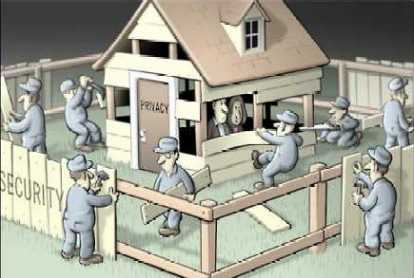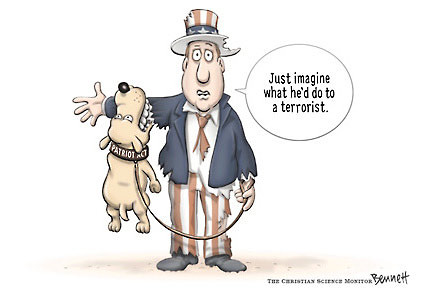How Patriotic is the Patriot Act?
Then...It was after the tragic events of 9/11. As the 9/11 Commission documented so well, terrorist threats were on a steady course to some cataclysmic action, but each administration was unwilling to confront these threats, preferring rather to selectively ignore them. People were saddened, scared and outraged that this kind of thing occurred in the US right under the government's nose. The government had to do something. John Ashcroft had that something in the Patriot Act.
Now...

On December 31, 2005, certain articles in the US Patriot Act of 2001 will expire under a "sunset clause" attached to the Act in the Senate. Since that time is quickly approaching, Congress will now be forced into a debate that should have happened almost four years ago. The US Patriot Act (cleverly renamed from the blase "US Anti-Terrorism Act of 2001") was passed with no debate and little opposition (almost unanimous) and has been in effect since October 2001 with little congressional oversight. So, it is not altogether shocking that now the entire act is open to questions.

In researching for this blog entry, I found no lack of opinions on the US Patriot Act and shouldn't have been surprised at the blinded partisan pundits on both sides. Those left of the aisle view the Patriot Act as the death knell to civil liberties and an ushering in of a "Big Brother" state. The right-wingers, particularly the war-hawks and pro-death groups, view the Patriot Act as a much needed hard-line, zero tolerance approach to dealing with terrorists, content the Act will only affect terrorism and presumably patriotism.
As usual, they are both wrong.
Rather than feed to my readers a pre-manufactured opinion courtesy of the DNC or the GOP, I offer my own homemade interpretation of the Patriot Act.
- Name:
I hate the name "US Patriot Act". This has nothing to with the football team, missile or a law-abiding citizen (hopefully). This has to do with terrorism and extending existing laws to give law enforcement better tools to detect domestic terrorists. The initial name of the Patriot Act was "US Anti-Terrorism Act of 2001". But the name change was definitely political, rallying the conservatives and outraging the liberals. Even Republicans commented on how impossible it was to explain to constituents they had voted against a bill called the "US Patriot Act"!
Also, the US Patriot Act defines domestic terrorism very broadly. Possibly puling many minor crimes and small grassroots organization into the definition, according to the ACLU's December 2002 article. - Civil Liberties:
Most of the act is focused on adding terrorist crimes to existing laws and updating current statutes. For example, adding terrorism to the list of valid warrant evidences and upgrading warrant collection to include voice-mail with e-mail. Very minor changes at all. Other parts of the act reduce or change existing procedures. Such as reducing the proof and process of obtaining "sneak and peak" warrants (no one is notified of the warrant or what was gathered except the issuing judge and federal authorities) and allowing pen tapping (electronic and voice interception) without any proof on foreign non-citizens within/outside the US. There is very explicit language that forbids this kind of tap on US citizens. The Patriot Act (Section 223) even provides the ability for any target to sue the government if the information gained was improperly handled or acquired.
What is absent is the kind of judicial or legislative jurisprudence that usually accompanies bills of this magnitude. It is not to say that it doesn't document areas of congressional and judicial oversight; the bill simply does not document any new operational standards short of previous legislation which limited much more restrictive executive powers. The heavy reliance on grand jury hearings in foreign intelligence investigations creates a dangerous clandestine nature to warrants and arrests. This grand jury can replace many other courts' jurisdictions without the need to be transparent or possess any oversight. These issues primarily frighten many civil libertarian groups. - Terrorist Funding:
The Patriot Act discards many banks' lax account handling policies, holding them liable for any funds laundered through them. It also expands the net of banks who face prosecution to include multinational banks (who had been somewhat exempt) located outside the US, but doing business in the US. - Needed Legislation:
Only one terrorist was unsuccessfully prosecuted under the Patriot Act. What is surprising is how often many areas of the Patriot Act are being used by law enforcement for non-terrorist related crimes. What also is hard to gauge is whether the Patriot Act's powers are really used to stop terrorist crimes before they occur as the Justice Department claims. Also, many broad authority increases are not accompanied by important restrictions that usually accompany such legislation.
Conclusion:
The Patriot Act is a mixed bag. It is definitely not the precision tool for anti-terrorism that some claim, nor is it the apocalypse of civil liberties that others claim. I think it is fair that there are some over-reaching powers that need clarifying and some which might require exclusion. The Patriot Act is not perfect. Obviously, there should be better requirements for congressional and judicial oversight as well built into the law.
One such recommended amendment to the Patriot Act is the Safe Act. It basically extends the sunset provisions of the Patriot Act to include controversial articles and adds important restrictions to other articles. I support the Safe Act myself, seeing this as a valuable compromise between the warring factions.
| Patriot Act Resources | |
|---|---|
Complete Act: | http://www.epic.org/privacy/terrorism/hr3162.pdf |
| Detailed analysis: | http://www.fas.org/irp/crs/RL31377.pdf |
| Safe Act Analysis | http://www.eff.org/Privacy/Surveillance/Terrorism/PATRIOT/safe_act_analysis.php |


0 Comments:
Post a Comment
<< Home